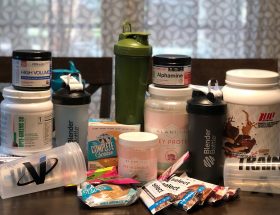Learning how to count calories – and what the word “macronutrient” even means – is a great way to develop a healthy relationship with food. It has taught me proper portion sizes, how much food I typically eat in a meal, and the nutrient breakdown of food. I want to give you a rough break down/introduction. If you want me to go deeper/more detailed, let me know and I will be more than happy to write more posts about the topic.
Disclaimer: I don’t view this as a diet. I don’t like the word diet. I still eat donuts and pizza. I don’t have a set day or meal or week that I eat certain foods. I don’t have cheat meals or treat meals. I just live life and make active decisions about what I put in my body. Second Disclaimer: I am not a Nutritionist or a Registered Dietitian. I am a Certified Personal Trainer and have a B.S. in Animal Science, so have nutrition knowledge. I don’t create meal plans and won’t tell you what foods to eat, but aim to help you make knowledgeable decisions.
I want to start first with explaining what the word macros means. It is short for “macronutrient.” The textbook definition is, “a substance required in relatively large quantities in living organisms.” For humans, this means carbohydrates, fat, and protein. Your body needs all three of these substrates for energy and basic functions down to a cellular level. FOOD IS ENERGY.
Carbohydrates are your body’s main source of energy. It is what gets utilized first when you are exercising. Carbohydrates are more than just bread and chips. Fruits and vegetables are jam packed with carbohydrates… they’re basically just carbs and water. This is a macro NOT TO BE FEARED. No macro should be feared.
Practically every human has a surplus storage of fat. As a result, you essentially have an endless storage of energy. YAY ENDLESS ACTIVITIES. When your body runs out of glycogen (the stored form of carbs), it starts to utilize triglycerides (stored form of fat) for energy. Fat is important for your skin health as well as aiding in your body’s absorption of vitamins.
Protein is composed of amino acids, which are the building blocks of your muscles. It is hardly ever used as an energy source. Without protein, your muscles will not be able to grow. *Insert Jenna Marbles Cerment Voice* “You must feed your cerment chicken or else it will not an grow.”
All three of these macronutritents have important and specific roles in your body functioning correctly. Your body has a set amount of calories necessary for all this “daily functioning”. What those calories consist of are these dang macros we keep talking about. 1 gram of carbohydrates and 1 gram of protein is 4 calories. 1 gram of fat is 9 calories.
NOW, on to learning the calories and macros you should be aiming for!!!! I could tell you the long drawn out way of doing it, or I could give you the shortcut. I’m going to give you the shortcut. Pull up Google and type in anything along the lines of “How To Calculate Macros” or “Macro Calculator.” Numerous websites should pop up. The most basic and straight forward calculator I have found is Katy Hearn’s. You can complete several different websites and average them together. Katy’s is linked here.
They will all ask you your 1) Age 2) Gender 3) Height 4) Weight 5) Goal and 6) Activity Level. Once submitted, the calculator will pop out the suggested grams of fat, carbs, and protein and total calories you should consume in a day. Keyword: Suggested. Take these numbers and plug them into a calorie tracking app (Such as My Fitness Pal).
Using serving sizes/cups/tablespoons or a food scale (what I recommend), start plugging in what you’re eating on a daily basis into My Fitness Pal (or other calorie tracking app). Take note of how many calories you eat per meal and the macro breakdown. You’ll quickly learn what foods are more nutrient dense vs. what foods are less nutrient dense. Look at you, now you know how to count calories!!!
What I want to drive home is that the only way to lose fat is to eat in a calorie deficit. The only way to gain weight is to eat in a calorie surplus. To maintain your weight you need to eat in a calorie maintenance. Whatever your goal is, the calories you consume are what is most important. Don’t lose sleep trying to eat exactly 60 grams of fat everyday. Don’t stress out about eating all 200 grams of protein. The calories are what’s most important. This is why I say the numbers are a suggestion. It gives you something to aim for, but it isn’t the end all be all. (Unless you’re in a body competition, then they’re more important). For example, my suggested protein intake is over 150 g, but I’m happy if I just make it to 100 g.
Final Disclaimer: this is just a ROUGH overview of macros and counting calories. I hope it was helpful nonetheless. Questions, concerns, leave ’em in the comments. DM me on my insta.








